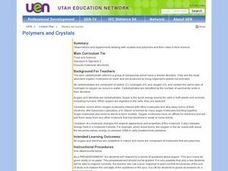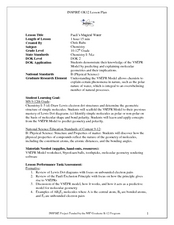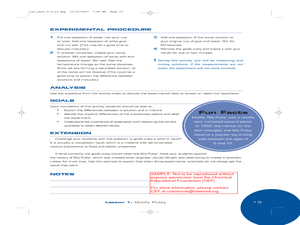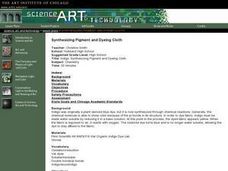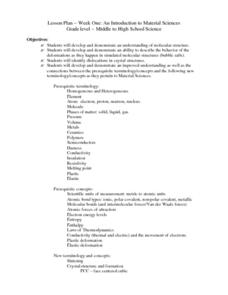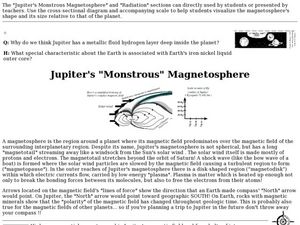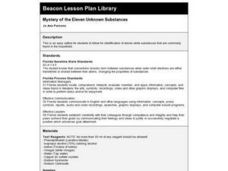Curated OER
Oxidation and Salt
Learners study the reaction on iron in water, air, and sodium chloride. They create a situation that shows this process and gives them the opportunity to hypothesize what, why, and how. They keep records and do an oral and written ...
Curated OER
Chemical Sleuthing
Students engage in a lesson which includes flame tests and the construction of a simple diffraction spectrograph with which to measure sodium ion emissions. They use the Bragg equation to compute the wavelength of the line spectra produced.
Curated OER
WHAT MAKES A LIGHT BULB LIGHT?
Learners are able to use inquiry to answer the essential questions. They are able to predict and test configurations of a battery, bulb, and wire that make the complete circuit. Students craft a group and individual theory of a...
Curated OER
The Effects of Temperature on Chemical Mixtures
Students explore chemical cahnges and the effect of temperature on chemical mixturees, They make observations of the behavior and appearance of certain chemical mixtures and reactions.
Curated OER
Solar Cells
High schoolers are able to answer basic questions about the process of turning light energy into electrical energy. They are introduced to the basic physics and chemistry behind the operation of a solar cell. Students explore how a...
Curated OER
Speeding up the Fizz
Students investigate temperature and chemical reactions. They explore the effect of temperature and particle size has on the rate of a simple chemical reaction. In addition, they graph their results and answer assessment questions.
Curated OER
Making Molecular Models
In these creative hands-on activities, young scholars construct several different molecular models that represent substances that play an essential role in our nutritional needs. Using gum drops and toothpicks, students design the...
Curated OER
Doing Lewis Dot Diagrams
Students observe the periodic table and draw the Lewis Dot Diagram. In this investigative instructional activity students construct information on several elements including the Lewis Dot Formation and take a quiz on the information...
Curated OER
Solution Chemistry Investigation
Students engage in a lesson that is concerned with the concepts related to solution chemistry. They calculate the molar mass of various chemical compounds. Then students predict the anion ratio for ionic compounds. Students also write...
Curated OER
Periodic Trends
Students explore the rationale behind the arrangement of the elements on the Periodic Table. Using internet and traditional research, students compare and contrast the properties of elements on the periodic table to determine a...
Curated OER
Chemistry Unit on Compounds, Formulas, and Equations
Learners perform a review assignment in 3 portions to review chemistry compounds, formulas, and equations. The assignment consists of several different portions that can be used as assessments. The majority of the lesson plan is composed...
Curated OER
What Color is Chlorophyll?
Young scholars observe the interactions of chlorophyll and light. They develop and form their own testable hypotheses. Students predict the color of chlorophyll in various types of plants.
Curated OER
Respiration
Students explore Adenosine Triphosphate and how energy is released. They examine the basic process of cellular respiration and draw its chemical formula. After describing cellular respiration and photosynthesis, students compare and...
Curated OER
Polymers and Crystals
Learners experiment with crystals and polymers and examine their roles in food science.
Curated OER
Pauli's Magical Water
Students predict the shape of molecules using VSEPR theory. In this chemistry lesson, students differentiate a polar and nonpolar molecule. They discuss why water's polarity is very important.
Curated OER
Goofy Putty
Young scholars examine mixtures and solution properties by making a borax polymer. In this chemical reactions lesson, students make a putty out of borax solution mixed to create a polymer.
Curated OER
Mechanical, Electrical and Radiant Energy
Students write a hypothesis and complete a lab. In this investigative instructional activity students complete their lab and a worksheet about energy.
Curated OER
Synthesizing Pigment and Dyeing Cloth
Pupils create a synthetic dye and oxidize the dye and record the effects.
Curated OER
An Introduction To Material Sciences
Students investigate the concept of molecular structure. They describe the behavior of simulated molecules and identify any dislocations in crystalline structures. They also define various related vocabulary words and use them in...
Curated OER
Jupiter's "Monstrous" Magnetosphere
Students explore Jupiter's magnetosphere. In this Jupiter instructional activity, students examine a diagram of the magnetic field that surrounds Jupiter.
Curated OER
Drops on a Penny
Eighth graders experiment to determine the number of drops of water a heads up penny hold. They create a stem and leaf graph of the class results and use the data for further experimentation on a tails up penny.
Curated OER
Mystery of the Eleven Unknown Substances
Fourth graders identify eleven white substances that are commonly found in the household. They, in pairs, perform experiments on a variety of substances, and must identify them based on the reactions they observe.
Curated OER
The Great Gas Race
Fourth graders improve their understanding of Graham's Law by using properties of gases to evaluate the rate of effusion of two compounds as they vaporize. They engage in a lab which elevates their understanding of the properties of gases.
American Chemical Society
Middle School Chemistry: Energy Levels, Electrons, and Covalent Bonding
Students discover the concept that two atoms can attract and form a covalent bond.















